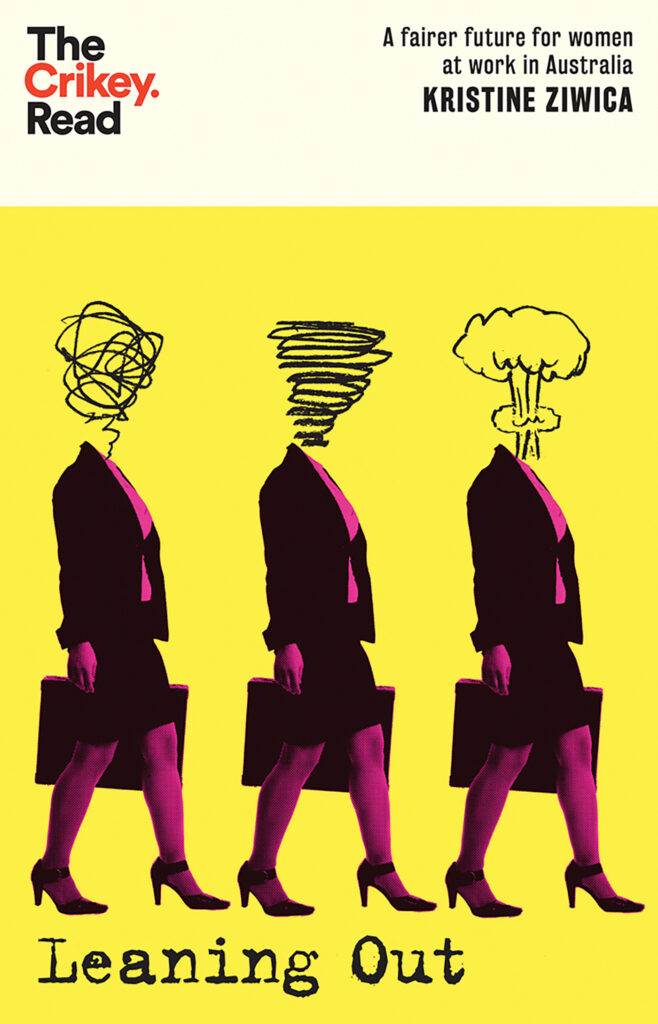In the new book ‘Leaning Out’, respected journalist Kristine Ziwica maps a decade of stasis on the gender equality front in Australia, and why the pandemic has led to a breakthrough. This short excerpt is published will full permission.
How do we begin to tackle the Great Exhaustion? (Editor’s note: Earlier in her book, Kristina defines ‘The Great Exhaustion’ as “…the absolute overwhelming feeling of emotional exhaustion like there’s nothing left in the tank.”)
Part of the answer lies in changing the conversation. We need to move away from lean-in ideas that posit the solution rests with individual women alone, who should devote more time and energy to their ‘wellbeing’ and simply shore up their resilience. Beware corporate ‘feminist wellness’, selling a soothing balm of herbal tea and scented candles – faux feminist Prozac to help women recover from the uniquely gendered impacts of the pandemic – instead of structural change.
Many are fond of quoting the late activist Audre Lorde, who once wrote, ‘Caring for myself is not self-indulgence, it is self-preservation, and that is an act of political warfare.’ And while that is absolutely true – and they are wise words for a growing army of feminist activists who are now taking to the streets in pursuit of gender equality – self-care as an idea and now an industry has been twisted beyond all recognition from Lorde’s original meaning.
This is ‘feminist wellness’ or self-care as a kind of escape, not, as Lorde intended, a restorative practice to give those seeking deeper, collective change the energy and resilience to persevere. This kind of feminist self-care is, at best, devoid of meaning in its attempt to move product or, at worst, a cynical attempt to divert women from the task at hand.
No one ever said, ‘Nevertheless she persisted with her daily regime of scented candles and massage therapy.’ (Though if I close my eyes and listen, I can almost imagine Gwyneth Paltrow uttering those words.)
The rise of the wellness industrial complex, particularly in relation to women, is mirrored by the way neoliberalism infected feminism in the 1990s. No structural inequalities to tackle collectively here, folks. This is an individual problem. But as Angela Priestley, the founding editor of Women’s Agenda, told me, ‘this isn’t something more lunchtime pilates will fix’.
This is not what we need at this critical juncture.
‘It’s really important that we look at the higher-level factors that have led to all of this,’ Dr Adele Murdolo, the executive director of Australia’s Multicultural Centre for Women’s Health, told me. COVID caused lots of stuff, but it also just exacerbated a lot of inequality that was already there. It showed it up and it made it more apparent to everybody.
‘We need to have a look at gender and race discrimination in the workplace and develop policies and programs that are knocking that off at the source, which is a big job and not something you can fix in a month because it’s something that’s so embedded in our workplaces,’ added Murdolo.

Cover of “Leaning Out: A Fairer Future for Women at Work in Australia.” Picture: Supplied
Lisa Annese, CEO of Diversity Council Australia, has said that ‘inclusion at work is an antidote to the great resignation’. She points to new research from DCA that demonstrates the link between non-inclusive behaviours and workers’ intentions to stay. Workers in inclusive teams are 4 times more likely than those in non-inclusive teams to report their workplace has positively impacted their mental health, and they are 4 times less likely to leave their jobs. ‘So you are investing in the wellbeing of your people, and making your business more resilient.’
We need to develop policies, legislation and programs that change not only workplace cultures and attitudes, but also the way that workplaces are structured; at the moment, workforces are really about the full-time, unencumbered male employee. We need to look at making workplaces really flexible.
Not flexible just for employers in terms of insecure work, but flexible for what people in families really need. We need childcare so that women are able to actively participate in the workforce. We need to tackle the gender pay gap, and not just as it relates to gender alone, but also taking into account ethnicity, disability and sexual orientation … all the intersecting forms of discrimination that make the gender pay gap even larger for some than others.
‘Bigger structural issues: pay equity, equal jobs of equal worth (particularly for women in undervalued caring jobs), childcare, giving people permission to voice the good, bad and the ugly is also part of the healing process,’ Leisa Sargent, the senior deputy deanof UNSW’s Business School and the University’s co-deputy vice-chancellor Equity Diversity and Inclusion,told me. ‘But I also think that making sure that employees are engaged in the decision-making process coming out of the pandemic is really important. We went through two years of being told what we had to do and how we had to do it, which is very disempowering.’
We now need to create opportunities where people feel they have a say in how things get done, in flexibility, in opportunities to work in different parts of the business and to be stimulated.
‘And it’s also about a fundamental redrawing of the boundaries,’ added Sargent.
Research from the Australia Institute’s Centre for Future Work suggests why a redrawing of boundaries may be particularly necessary, as the pandemic has only exacerbated the trend towards the intensification of work and highlighted the costs of insecure work, where women are heavily concentrated. The research found that the average worker did
6.1 hours per week of unpaid overtime in 2021, a substantial increase on 2020.
‘Let’s make jobs plentiful, safer, secure and invest in social institutions that support people, in particular women, to work’, Alison Pennington, a senior economist at the Centre for Future Work, told me was the quite simple, yet powerful, prescription.
‘The treadmill of insecure work fuels anxiety and makes planning for a decent life nigh impossible. The reality is that the human cost of unchecked employer power is enormous. And there are multiple indicators that this power has deepened over the pandemic.’
The solutions are structural and collective, going far beyond self-care, and even beyond direct psychological treatment for women’s mental health, though this is undeniably necessary and should be addressed with more targeted and innovative mental health support. At the time we spoke, Professor Jayashri Kulkarni, for example, had just opened Australia’s first dedicated mental health centre for women, a specialist model she would like to see replicated elsewhere.
As we endeavour to ‘build back better’, we need these types of broad, wide-ranging proposals as part of the wider debate about women and work. The changed conversation around women’s workplace burnout and the factors driving that will play a significant role in moving the conversation forward from the lean-in feminism that has so far dominated the Australian landscape to something better, something more impactful and meaningful. If that happens, then women’s collective suffering during the pandemic won’t have been in vain.
- Leaning Out: A Fairer Future for Women at Work in Australia is out now
Kristine Ziwica is a Melbourne-based columnist who has 20 years' experience working in Australia, the United States and the UK on human rights and gender equality campaigns.





